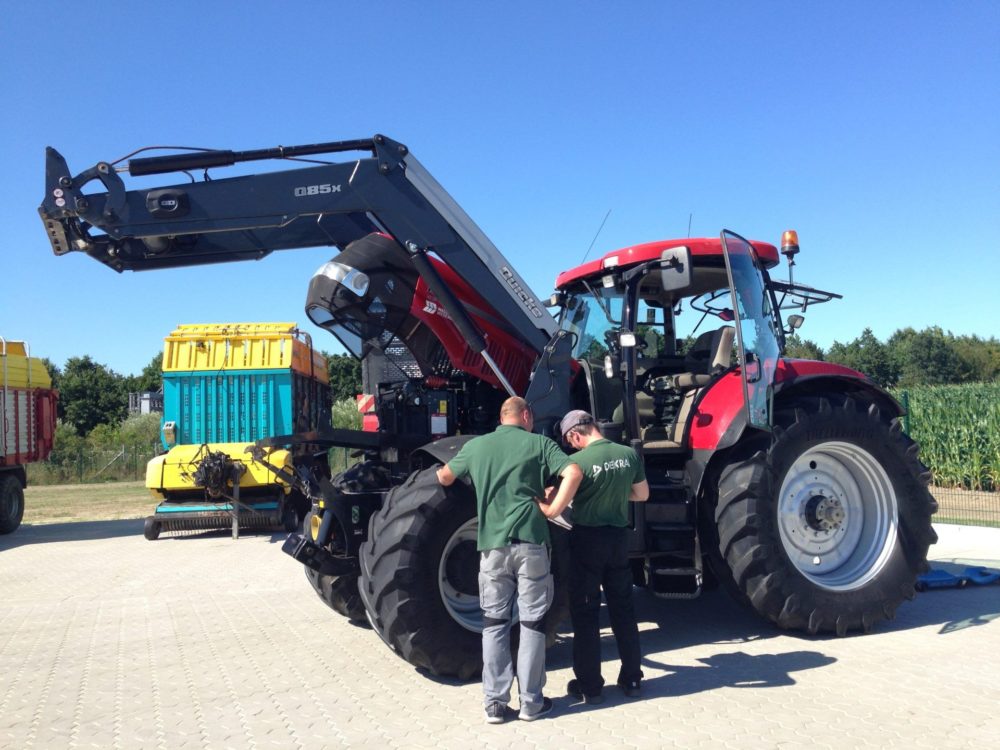The ‘circular economy’ trend has reached industries as seemingly far apart as food and fashion.
Could agricultural equipment be next?
The global market for farm machinery exceeded $100 billion in 2019, according to the German Mechanical Engineering Industry Association. Typically, however, secondhand models get sold through an opaque hodgepodge of informal regional listings, leading to limited price or quality transparency and strong market inefficiencies.
If they don’t listen, start a company
German entrepreneur Nicolas Lohr bemoaned these inefficiencies several years ago as a management consultant for Oliver Wyman. However, his warnings to clients — including several major agri-manufacturers — were too often treated like those of Cassandra: They were noted in passing, but rarely acted on. Frustrated, Lohr founded E-Farm in 2015 alongside co-founder Franz von Consbruch, who formerly worked at the tractor manufacturer Claas.
Today, Lohr tells AFN, the pair manage a digital agribusiness marketplace for secondhand farm machinery with a team of around thirty employees and a connected network of around 750 partner dealers across Europe. Since its foundation, Hamburg-based E-Farm has already handled transactions between more than 50 markets worth around €25 million ($29.4 million).
Better still, the company has just closed its Series A financing round at $5.3 million, led by Swedish early stage investor WiT Ventures.
A newly launched but undisclosed German agtech VC also participated; and, in a sign that the big manufacturers are showing greater interest in resale marketplaces, existing investor Claas has extended its commitment in this round. (Lohr specifies that having Claas as a minority investor doesn’t entitle it to any grace and favor on E-Farm’s platform; the startup takes a neutral stance for all industry players, and keeps information on rivals strictly out of reach, he says.)
A close look at E-Farm’s product offering shows how the company is more than just a Craigslist or Gumtree for tractors. “We manage the full transaction, as well as extra services around the transaction,” Lohr says.
That could mean layering on inspection services, warranty schemes, insurance quotes, and extended payment systems. In doing so, it solves the two traditional obstacles around trust, he says: “Lack of transparency and up-front payments.”
A Klarna for farm machinery…
Lohr suggests that it makes sense to think of its payment-on-delivery solution as “Klarna for farm machinery,” referring to the Swedish fintech company that provides this option for other goods and services.
Quality assessments of the secondhand machinery on E-Farm’s marketplace is independently carried out by Stuttgart-based vehicle inspection company DEKRA, which can provide an EU-wide warranty. Additional services for financing, customs, and transport offer a simplified and holistic transaction process for farmers keen for quick and painless deals.
“It increases the liquidity of Europe’s machine park,” says Elias Jacobson of Sweden’s WiT Ventures, recounting his firm’s decision to invest. A Swedish agricultural journalist had initially advised him to look into the startup, he adds.
“A used tractor either gets scrapped, or it sits in the farmyard, or it takes up space at a dealership,” he continues. “That is no good to anyone. By having more owners on each tractor’s life cycle, you’re getting more use out of each machine.”
…But not an Uber for tractors
One concurrent idea in this vein is to create an ‘Uber for tractors,’ where ownership is pooled and tractors and other farmyard machinery rented on demand. But Jacobson thinks that such ‘shared economy’ schemes, though conceptually compelling, can fall to practical difficulties of surging demand during overlapping harvest times.
Instead, he likes E-Farm’s focus on making reuse and international resale hassle-free and networked. “A German farmer may [no longer] need his used machine,” he says, “but maybe a Greek farmer needs to have it.”
In the end, according to Jacobson, E-Farm is providing retail options that can cut out middlemen and help drive down prices, all to the benefit of farmers operating on tight margins.
For the next six months, refinancing and spare part offerings will be an important component, as will price prediction software based on deep learning, he says. WiT Ventures has already teamed E-Farm with its former portfolio company Peltarion. Together, they’ve been working on improving data sets and automating the valuation process via computer vision and machine learning, the aim being to recognise specific tractor traits from images that could affect their resale value.
Digitalizing agribusiness marketplaces
As with the recent funding round for Turkish agrifintech platform Tarfin, global interest is running high in agribusiness marketplaces as the search goes on to replace analogue practices in an age of social distancing and travel restrictions. AFN recently reported on the $23 million Series B round of Argentina’s Agrofy – at the time, the largest fundraising effort for a South American agtech startup on record. Agrofy is an online marketplace matching buyers and sellers of a wide range of agricultural products, from machinery and crop inputs to farmland and financial services, often through existing retail relationships.
In France there’s Agriconomie, which works with incumbents to offer an ag marketplace for farmers and their suppliers with advanced logistics capabilities and a streamlined value chain that reduces costs. Across Europe in Estonia, E-agronom just raised €1.2 million ($1.4 million) to expand its digital consultancy services and launch operations in Australia. That round included SuperAngel VC, IronWolf Capital, Cats.VC, and Martin Villig – founder of the mobility unicorn Bolt – along with Salv founder Taavi Tamkivi and other angel investors.
In the US, there are offerings like Farmers Business Network – a farm data startup that has pivoted to selling inputs with uniform, transparent pricing – and HarvestPort, which did a pivot of its own from machinery lending to inputs sales last year.
India has myriad startups cropping up in this space; one among them is DeHaat, which raised $12 million in a Sequoia Capital-led round in April. [Disclosure: DeHaat is a portfolio company of AgFunder, which is AFN‘s parent company.]





